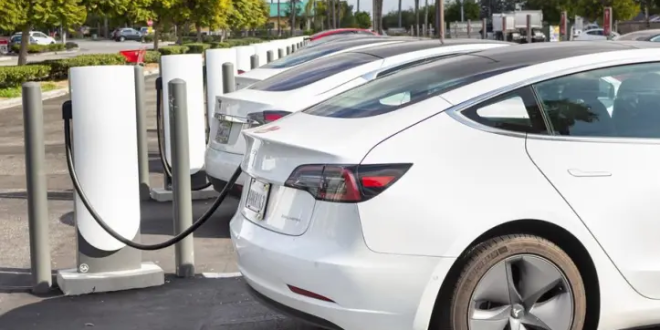Mobile apps are very important to the move toward long-lasting communities for electric vehicles (EVs). These apps not only make having and driving an EV easier, but they also help people be more eco-friendly by helping them figure out how to use less energy, find charging stations that are good for the environment, and plan routes that are good for the environment.
Apps are a key part of making electric cars (EVs) easier to get and better at what they do, which will lead to a cleaner and more sustainable future.
Enhancing Charging Infrastructure Accessibility
One of the major hurdles in the widespread adoption of EVs has been the limited availability of charging stations. Mobile apps have become an essential solution to this problem by helping users locate charging stations easily. Apps like PlugShare and ChargePoint allow drivers to find the nearest charging point, check its availability, and even reserve a spot.
- Real-time charging station data: These EV app development companies provide real-time updates on the availability of charging stations, allowing EV owners to avoid wasted trips and ensure efficient charging schedules.
- Integration with GPS: Many apps integrate with the vehicle’s GPS system, making it easier for drivers to navigate directly to the nearest charging station.
- Sustainability ratings: Some apps offer sustainability scores for charging stations, allowing users to choose the most eco-friendly options, further encouraging environmentally conscious behaviors.
By facilitating access to charging infrastructure, apps are making electric vehicles more practical and reducing concerns around charging availability.
Optimizing Route Planning for Efficiency
Another key contribution of apps to sustainable EV ecosystems is their role in optimizing route planning. EV drivers need to consider factors such as battery range, terrain, and the location of charging stations. Apps that offer smart route planning help drivers minimize energy consumption and optimize the vehicle’s efficiency.
- Battery range estimation: Apps that track battery usage can predict how far a vehicle can travel on its current charge and recommend routes that reduce energy consumption, considering factors like speed limits, traffic, and road conditions.
- Charging station integration: These apps suggest routes that include charging stops at optimal points, helping drivers avoid running out of charge in remote areas.
- Eco-driving suggestions: Some apps also offer eco-driving tips, such as maintaining a consistent speed or using regenerative braking, which can improve energy efficiency and reduce the environmental impact of driving.
These route planning features allow EV owners to drive more efficiently, reducing their overall carbon footprint.
Promoting Renewable Energy Usage
Many EV owners are concerned about the sustainability of their energy sources. Even though electric vehicles themselves produce zero emissions, the electricity used to charge them may come from non-renewable sources. Apps are helping to bridge this gap by promoting the use of renewable energy for EV charging.
- Green charging options: Apps like Greenlots allow users to find charging stations powered by renewable energy, such as solar or wind power. By selecting these stations, drivers can reduce their reliance on fossil fuels and contribute to a cleaner energy grid.
- Home charging management: For EV owners who charge their vehicles at home, apps can manage energy usage and ensure that charging occurs during periods of high renewable energy production. This can also help users take advantage of lower electricity rates during off-peak hours.
These features promote the use of renewable energy in EV charging, further reducing the environmental impact of electric vehicle ownership.
Supporting Vehicle-to-Grid Integration
Vehicle-to-grid (V2G) technology allows electric vehicles to not only draw energy from the grid but also return unused energy back to it. This technology can help balance the electricity grid during peak demand periods and support the integration of renewable energy. Apps are essential in managing V2G systems by enabling users to monitor and control their vehicle’s energy flow.
- Energy flow management: Apps allow users to control when their vehicle should charge or discharge energy, ensuring that they can contribute to grid stability while still having enough battery for their driving needs.
- Grid feedback: These apps also provide real-time data on grid demand, enabling users to make informed decisions about when to sell energy back to the grid.
- Revenue generation: In some cases, these third party apps enable users to earn money by selling excess energy back to the grid, creating an additional incentive for adopting sustainable practices.
Through V2G technology, apps are playing a critical role in integrating electric vehicles into the broader energy ecosystem, making them active contributors to grid sustainability.
Encouraging Eco-Friendly Driving Habits
Beyond the technical aspects of charging and route planning, apps are helping to cultivate eco-friendly driving habits among EV owners. By providing real-time data and feedback on driving behavior, apps can encourage users to adopt practices that reduce their environmental impact.
- Energy consumption tracking: Apps that monitor energy consumption can give drivers insights into how their driving habits affect their vehicle’s efficiency. For example, rapid acceleration or high-speed driving can deplete an EV’s battery more quickly, and apps can notify drivers of these behaviors.
- Eco-friendly scores: Some apps assign scores based on how efficiently the vehicle is being driven, encouraging users to adopt smoother driving techniques that conserve energy.
- Community challenges: In some cases, apps create community challenges where drivers can compete to achieve the best eco-driving scores, promoting friendly competition and sustainable habits.
By promoting responsible driving behaviors, apps not only help EV owners extend their vehicle’s range but also contribute to a more sustainable driving culture.
Simplifying Maintenance and Sustainability Tracking
Regular maintenance is essential for keeping any vehicle in optimal condition, and electric vehicles are no exception. However, maintaining an EV requires some different considerations compared to traditional cars, such as monitoring the battery and ensuring that software is up-to-date. Apps are helping EV owners manage these tasks more easily.
- Maintenance reminders: Apps can track the vehicle’s service history and provide reminders for essential maintenance tasks, such as battery checks, tire rotations, and software updates. By keeping the vehicle in good condition, these apps help reduce energy waste and extend the vehicle’s lifespan.
- Sustainability tracking: Some apps allow users to track the environmental impact of their driving over time, providing data on how much CO2 has been saved by driving electrically. This can be a powerful motivator for continued adoption of sustainable practices.
These features help EV owners maintain their vehicles efficiently and ensure that they continue to operate sustainably.
Facilitating Car-Sharing and Ride-Sharing Services
In addition to personal EV ownership, apps are playing a significant role in promoting the sustainability of electric vehicles through car-sharing and ride-sharing services. These services help reduce the total number of vehicles on the road, leading to less congestion and lower emissions.
- Electric car-sharing platforms: Apps that enable electric car-sharing services allow multiple users to share a single vehicle, reducing the overall demand for new cars and minimizing the environmental footprint of transportation.
- Ride-sharing with EVs: Similarly, ride-sharing apps that prioritize or exclusively use electric vehicles are helping to reduce emissions from public transportation. By encouraging the use of EVs in ride-sharing fleets, these apps contribute to cleaner urban environments.
These shared mobility solutions, powered by mobile apps, are key components of a sustainable transportation ecosystem.
Conclusion:
Mobile apps are a vital tool in supporting the development of sustainable electric vehicle ecosystems. By enhancing charging infrastructure accessibility, promoting renewable energy, encouraging eco-friendly driving habits, and supporting vehicle-to-grid integration, these apps are helping to make EVs more practical, efficient, and environmentally friendly.
As electric vehicles continue to gain popularity, the role of apps in promoting sustainability will only grow, making them an essential part of the journey toward a greener future.
 Diverse Perspectives: Insights & Stories Exploring Ideas, Sharing Knowledge
Diverse Perspectives: Insights & Stories Exploring Ideas, Sharing Knowledge





